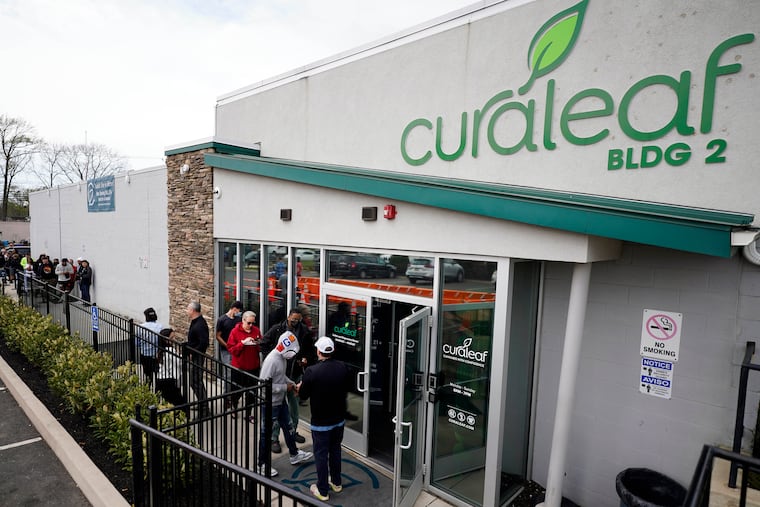Philly medical marijuana dispensary Curaleaf sued for allegedly breaking the city’s Fair Workweek law
The Massachusetts-based company denies that it violated a city mandate to provide fair and predictable schedules to workers at its two Philadelphia stores.

A former employee at a South Philadelphia Curaleaf store has filed a lawsuit alleging that the cannabis retailer violated a city law that requires employers to provide predictable and regular scheduling for workers.
The lawsuit, which the plaintiff hopes will become a class-action case, marks the latest push to keep large retail, restaurant, and hotel groups in compliance with the city’s Fair Workweek Law, which went into effect more than two years ago. The law requires most large chain companies to give workers their schedules 14 days in advance and compensate employees with “predictability pay” for last-minute shift changes.
The Massachusetts-based cannabis company Curaleaf — which now bills itself as “the world’s largest cannabis company” in terms of revenue — operates two dispensaries in Philadelphia and at least 18 stores statewide, as well as several locations in New Jersey.
In a complaint filed Tuesday in the Philadelphia Court of Common Pleas, former employee Frankie Kelley alleged that, as a sales associate at Curaleaf’s Passyunk Avenue dispensary between July 2020 and April 2022, managers routinely rearranged their schedule and failed to compensate workers for abrupt changes.
“There were obvious signs of things that are not abnormal practices in my experience in the retail world,” Kelley said in an interview. “But your schedule is not being respected. You’re not being heard as an employee.”
In an e-mailed statement, Curaleaf vowed to fight the claims in court.
“Curaleaf is committed to providing a fair workplace environment for all its team members in Pennsylvania and across the country, and strongly denies the allegations in this complaint,” the company wrote. “We believe that our policies are compliant with the Philadelphia Fair Workweek ordinance and that team members were given the requisite notices.”
Kelley, 32, said they were excited to segue into the cannabis industry after years in retail and hospitality. The sales job at Curaleaf allowed them to help meet real medical needs for customers. But erratic scheduling soon became a problem.
» READ MORE: Retail and fast-food workers: These are your rights under Philadelphia’s Fair Workweek law
Kelley worked as a supervisor at a Starbucks in 2020, where they were trained about Fair Workweek compliance as the law went into effect. But when they approached Curaleaf managers with instances in which the company was allegedly sidestepping the new law, they said, the complaints went ignored.
“Once you express issues to management and they’re not being handled or looked into, it’s really disheartening and dehumanizing,” they said.
The city’s Office of Worker Protection has received 77 complaints about violations since the law went into effect, said office spokesperson Obafemi Matti, noting that violations can result in “payment of presumed damages to all affected employees and other penalties such as reinstatement and restitution of lost wages.”
Workers covered by the law have two options to fight back: File a complaint with the city’s labor office, or take it to court.
To date, the office has handed down penalties to a handful of large employers for breaking the law — including Target, Rite Aid, and Del Frisco’s Double Eagle Steakhouse, which agreed in August to pay $24,500 to workers over unlawful scheduling claims. (In that case, the Houston-based steakhouse chain maintained that it didn’t break the law, but nonetheless agreed to pay the largest fine in Fair Workweek’s short history.)
Far fewer cases have been taken up in court.
Ryan Hancock, an employment lawyer with Willig, Williams & Davidson who is representing Kelley, said he believes this to be the second case taken to Philadelphia court, following a lawsuit filed by two Walmart employees in July.
Under the law, every company in Philadelphia with at least 250 employees and more than 30 locations worldwide — think big-box stores and corporate chains — is required to post information outlining the new labor protections created by Fair Workweek.
But Hancock said most workers are still unaware that the law exists.
“That is why it is important that these cases are brought in a public forum,” he said. “Hopefully, this lawsuit will help raise awareness around the [law] and will further encourage employers to follow the law.”
If the class-action case is successful, Curaleaf could be forced to pay damages to about 100 employees who worked at the company’s two Philadelphia stores over the two-year period identified in the lawsuit, Hancock added.
The plaintiff has requested a jury trial.